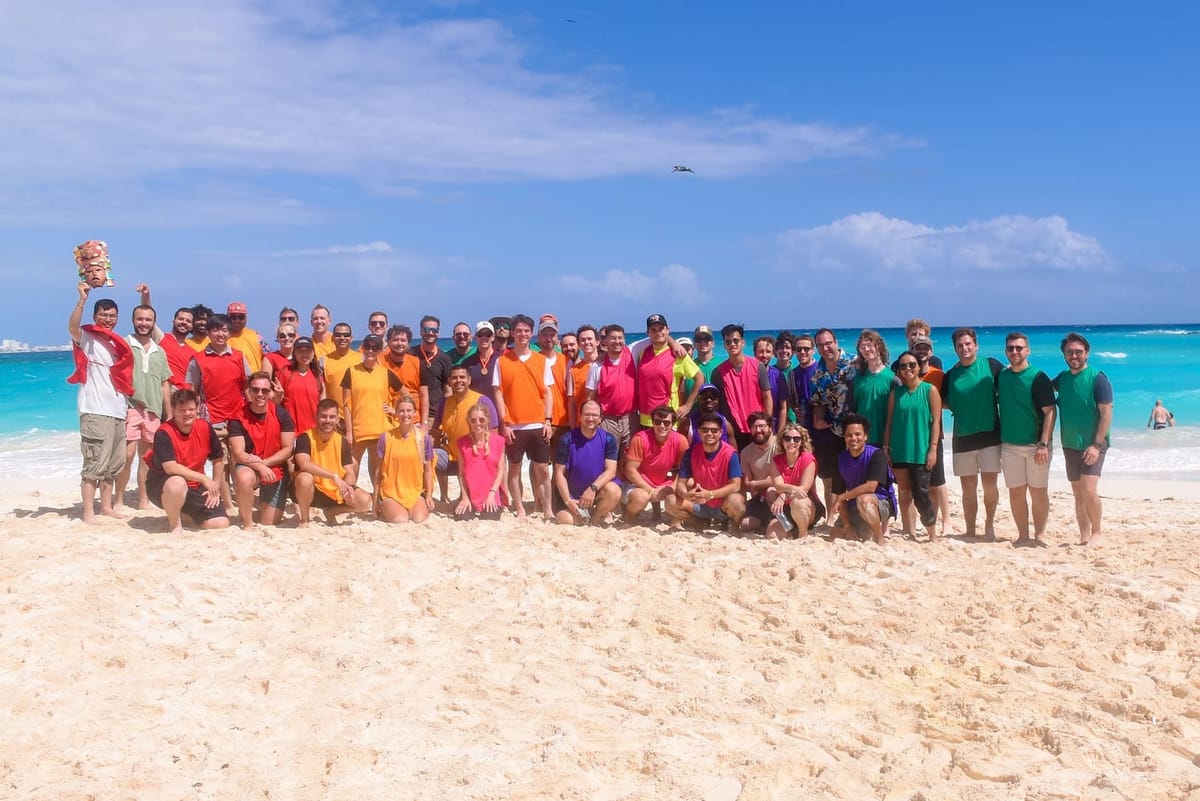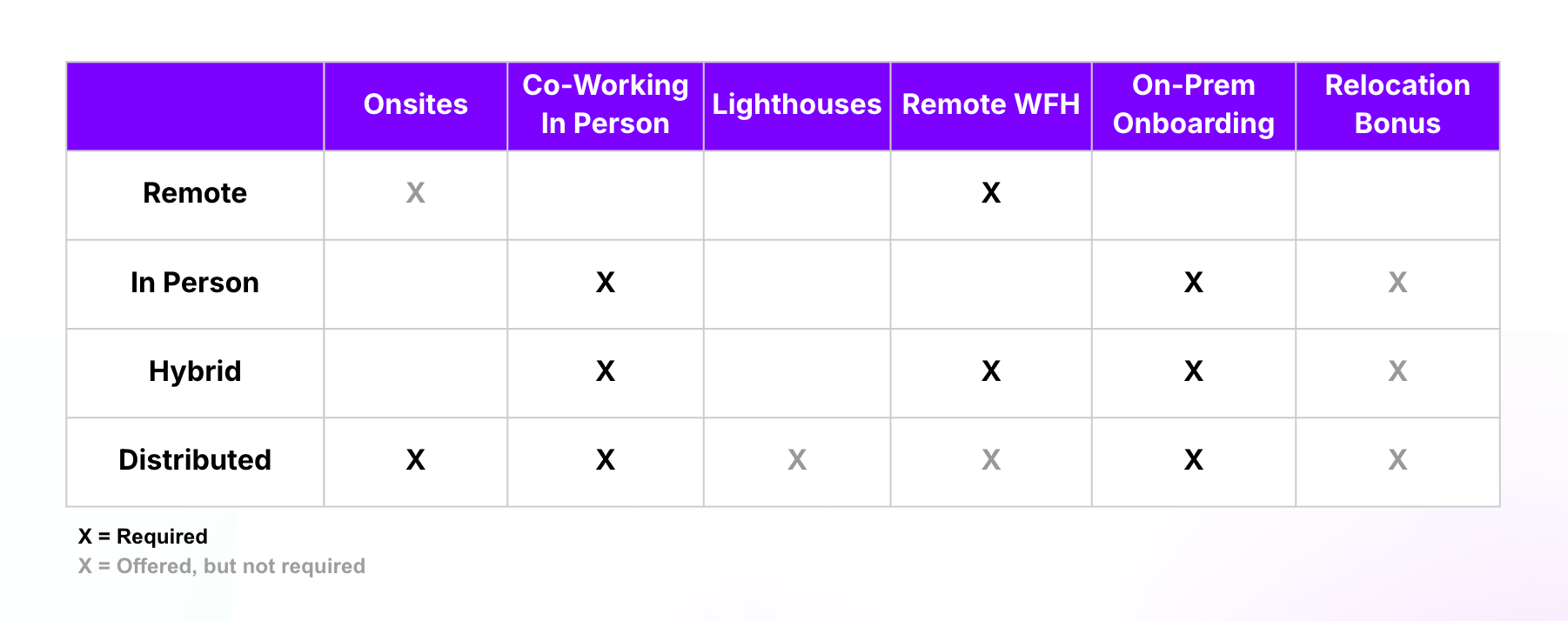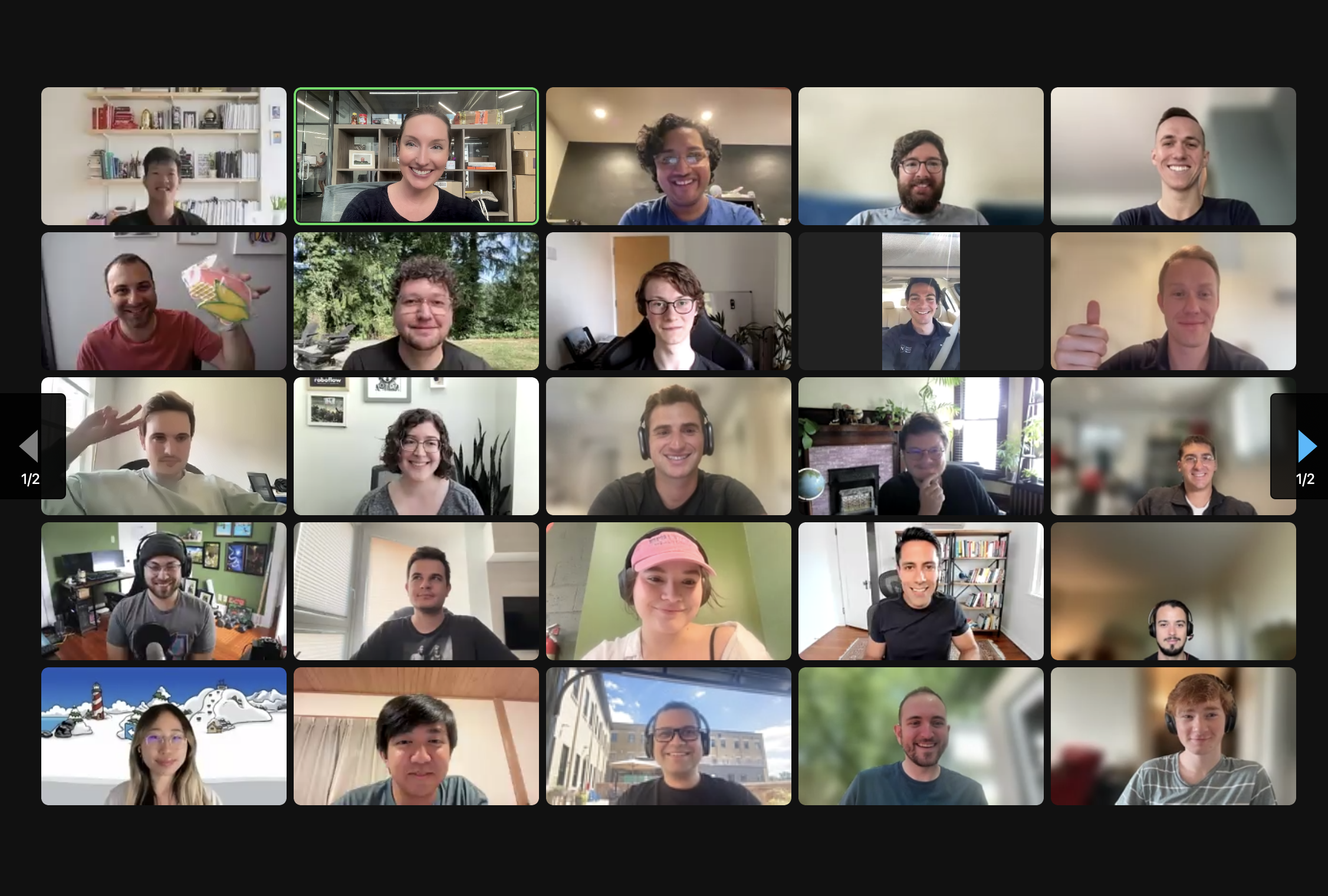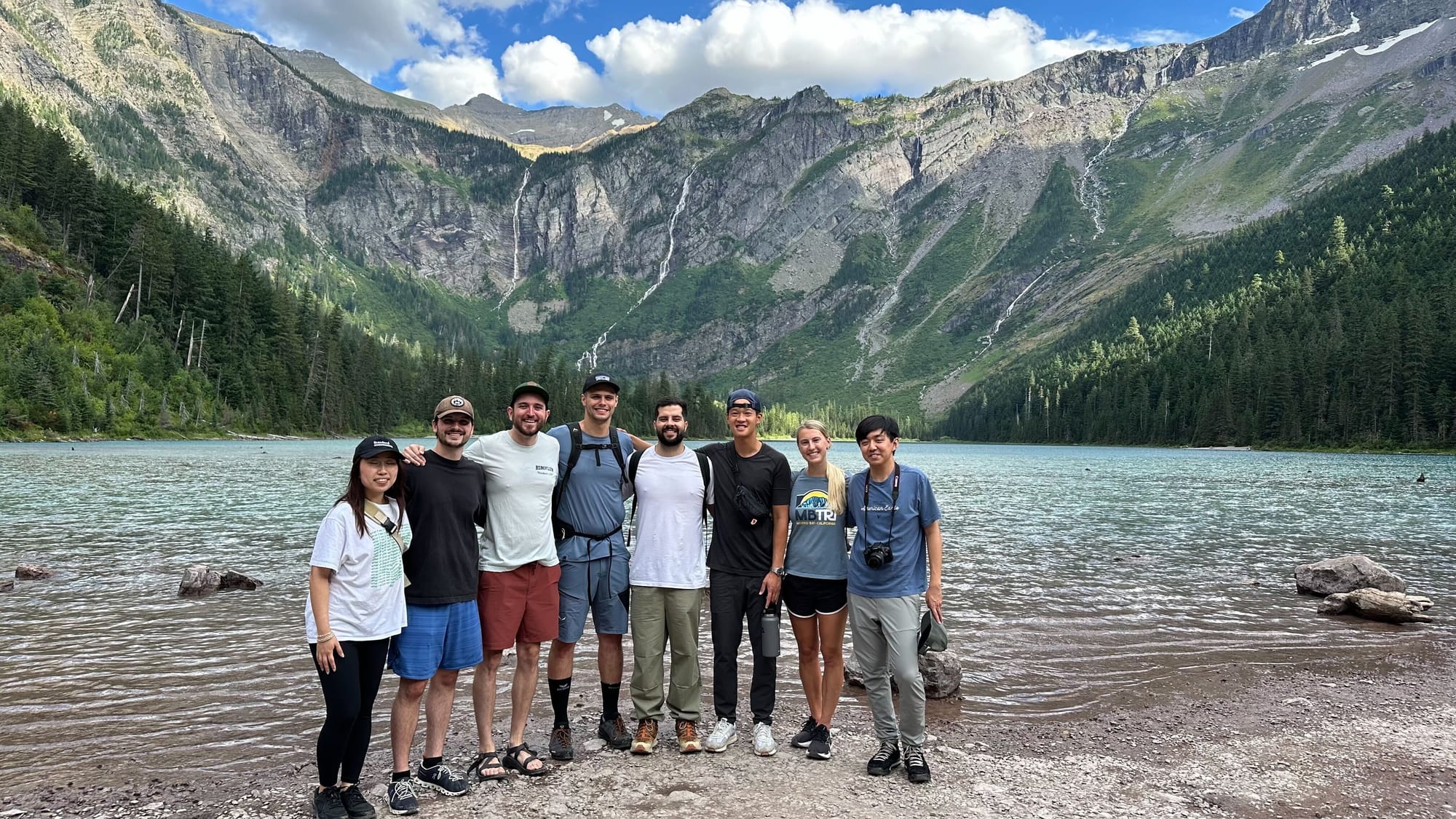
The way we work is changing. A decade ago, working in an office was the default. Now, many alternatives have gone main-stream: fully remote work, partially remote work, "core" hours or days, and more. As a result, companies have been grappling with the challenge of defining where and how people should work. Some fast-growing startups, previously untethered by location constraints, have doubled down on flexible, remote-first work. Major corporations like Apple relaxed office mandates, while companies like Meta took a hardline approach, requiring employees to return to the office. Meanwhile, other organizations, such as HubSpot, Spotify, and Lyft, have embraced hybrid models that allow employees to work in-office, remotely, or a mix of both.
But these hybrid models, though an improvement, often don't meet the needs of smaller or rapidly growing companies. They fall short when it comes to cultivating company culture, iterating quickly, building relationships, and gaining the context needed for high-performance collaboration. These are all essential for startups, where speed and close collaboration on projects is essential to success.
Additionally, for talent acquisition, the ability to support team members across different locations without losing connectivity is essential.
At Roboflow, we have been building a system that takes the best of all the options, enabling people to work from anywhere and get together in person. We call it Distributed Work.

What is Distributed Work?
Distributed Work is our approach to a hybrid, flexible work model that allows employees to work remotely, in-person at one of our office Hubs, or a mix of both. However, unlike fully remote work, distributed work requires the team to come together on a regular basis. This model revolves around defined, periodic gatherings—all company onsites, co-working events, and team meetups—that foster connection, build trust, and drive alignment.
Key components of Distributed Work:
- Flexible Work Locations: Employees can work remotely, in-office at a company Hub, or a mix of both depending on their location and preference.
- Regular Gatherings: The team meets periodically in-person at designated company hubs, all company on-sites, or through team organized onsites at various locations.
- Access to Resources and Tools: Employees are provided with the tools and stipends to ensure they can work productively, no matter where they are or how they work best.
- Cultural Integration through Transparency and Documentation: Distributed work fosters camaraderie and team cohesion through intentional documentation that outline cultural norms and behaviors.
Distributed Work enables Roboflow to hire and maintain a distributed team across five countries (and counting!), creating a culture that thrives on flexibility, autonomy, and connection.

Why Distributed Works For Us (And Could Work For You)
Roboflow’s team is spread across five countries, from the United States to the UK to Brazil, we’ve organized large and small onsites in places like Canada, Mexico City, and Europe to allow team members to gather
Distributed Work has expanded our talent pool exponentially, enabling us to hire the best people regardless of location, while still maintaining a strong sense of connection and collaboration.

However, Distributed Work is not a one-size-fits-all solution. It requires companies to offer more robust benefits than typical office-based work structures—around 12% more in some cases—and calls for team members who thrive in a high-autonomy, results-driven environment. Thus, to be successful, a company needs to find a balance between distributed locations flexibility and in-person connection, and ensuring your team can succeed in both spaces.
How Does Distributed Work in Practice?

The core principle behind Distributed Work is autonomy. Employees need to have the freedom to choose when and where they work, while still having the resources and infrastructure to come together when it matters most.
Here’s how Roboflow implements Distributed Work:
1. Providing Access to Office Hub and Co-working Spaces
Our Hubs in San Francisco, New York, and Brazil offer employees convenient spaces to work from on a regular basis. In addition to this, we provide $350 monthly productivity stipend to support team members who prefer working from co-working spaces or need to improve their home office setups, like high-speed internet
ensures that people have the tools and environment they need to be productive, whether they’re working from a co-working space in Berlin, a café in San Francisco, or their living room.
2. Offering a Travel Stipend
We offer a $4,000 annual travel stipend that team members can use to travel to other team members' locations or attend a Lighthouse event. This fund helps bring people together across the globe, making it easy for our team to connect in person despite being spread out geographically. It also reduces the company operational overhead of planning everything for teams because team members have the power to plan trips themselves. Recent Lighthouses have taken place in places like Mexico City, Palm Springs, Vienna and Nashville. In all of these Lighthouses, our team has worked together, brainstormed, and, importantly, built deeper personal relationships.
3. Organizing Company-Wide Onsites
Twice a year, we host all-company onsites that bring the entire team together to focus on building our company culture, planning for the future, and strengthening relationships. These gatherings are a key part of how we stay aligned and ensure that we have strong interpersonal connections across the team. Our onsite events have become some of the most anticipated times of the year among the team. They are instrumental in strengthening our collective vision and camaraderie.

4. On-Prem Onboarding for New Hires
For all new hires, we require on-prem onboarding. This involves a multiple days within their first two weeks of joining the company working side-by-side with their teammates in one of our Hubs.

On-prem onboarding ensures that new employees quickly build relationships, learn our processes, and get a feel for our working cadence. It’s also an opportunity to immerse themselves in our culture early on, setting the foundation for their long-term success.

5. Flexible Schedules
To accommodate the various time zones and locations of our team, especially our international team, we allow flexible schedules. Our team members work in countries ranging from the US and Canada to Scotland to Poland. Our policy of flexible schedules gives all team members the freedom to choose when and where they work, while still ensuring we have synchronous overlaps for collaboration, particularly in customer-facing teams.

6. Public Communication by Default
For us to work efficiently across time zones and locations, we’ve made public communication a priority. For example, we post all Slack conversations in public channels (withthe exception of sensitive or personal topics). Whether it’s in Slack channels, Slab documentation, or product roadmaps, we ensure that information is accessible to everyone, regardless of location. This transparency fosters inclusion and allows everyone to stay aligned and contribute to decision-making, no matter where they are.

Distributed Work Is A New Way To Build Culture and Drive Success
Three years into our distributed work journey, we’ve seen firsthand how this approach enables teams to remain connected, productive, and high-performing, regardless of where they’re located. By combining flexibility with structure—through distributed work, in-person gatherings, and the right set of tools and practices—we’ve built a thriving, global team that works smarter and more effectively together.
“Having worked in numerous companies before, I have found Roboflow to be the most refreshing and genuine culture so far! 'Culture' is a word that tends to be thrown out these days as a tick the box exercise instead of an intentional, meaningful mission. I would describe the workplace culture here to be open, collaborative, supportive and fun- everyone genuinely seems to have an interest in one another and the work we're doing!” - A Roboflower describing our culture in most recent Culture Survey
The lessons we’ve learned along the way—such as the importance of documentation, the value of regular onsite gatherings, the power of mini-team meetups, and the need for transparency—have shaped the way we work. For us, distributed work is not just a model for distributed work; it’s a framework that aligns with our values and helps us scale in a sustainable and team-centered way.
While distributed work isn’t for every company or every person, it has proven to be a powerful way for Roboflow to maintain agility, foster collaboration, and tap into the global talent pool. Whether your team is large or small, we encourage you to explore how a flexible, hybrid approach might work for you.
If you think Roboflow’s work environment is right for you, we’re hiring!

If you adopt distributed work, we’d love to hear from you and learn from your internal practices!
Cite this Post
Use the following entry to cite this post in your research:
Kate Wagner, Joseph Nelson. (Aug 11, 2023). How We Work Together at Roboflow. Roboflow Blog: https://blog.roboflow.com/how-we-work-together-at-roboflow/
